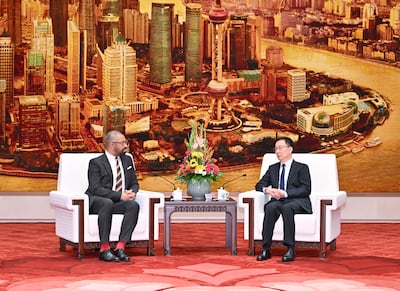With the absence of Vladimir Putin and Xi Jinping, UK Prime Minister Rishi Sunak’s presence at the G20 summit in India later this week is set to garner more attention than expected. As far as venues go, New Delhi is the perfect place for Mr Sunak to emphasise the UK’s foreign policy priority of stronger engagement with the Indo-Pacific countries.
As a report on London’s Indo-Pacific tilt by the UK Parliament’s foreign affairs committee highlighted last week, the rise of the middle classes in India and Indonesia, another G20 Asian nation, should be a key theme in British diplomacy.
The word “middle” has several different applications or meanings throughout the parliamentary report. Three of these usages – middle classes, Middle East and middle powers – provide us with a key test for the policy, which was updated in what’s been called the Integrated Review Refresh from Mr Sunak’s team earlier this year.
The MPs on the select committee highlighted concerns over the lack of attention given to the Middle East in the UK’s foreign policy since 2021. Taking on the comments of expert witnesses who testified at the evidence session, the MPs’ report points to an imbalance in the policy that has harmed British interests.
It says that Harry Halem and Jay Mens, from the Cambridge Middle East and North Africa Forum, acknowledged that the Indo-Pacific was of vital importance to British foreign policy and grand strategy. However, these experts also suggested instead that a “tilt to the Middle East is more apt for British capabilities”.

“The tilt [to the Indo-Pacific] may have had the negative side-effect of eliciting a feeling of neglect in areas that appeared to have been tilted away from, like the Middle East,” the MPs’ report said.
The authors of the report not only highlighted the setback in the UK’s Middle East policy but also the downgrading of ties with EU. Perhaps that was part of the fallout from Brexit, by which the UK left the EU after a 2016 referendum, but it can be seen now to have been an interregnum for the country.
The MPs noted that UK Foreign Secretary James Cleverly himself conceded that “tilt to” language had implied a shift away from others and that was something negative. The term also introduced relative weightings into foreign policy, something diplomats and strategists are schooled to avoid.
In fact, the Integrated Review update from Team Sunak significantly omitted the term Global Britain and dropped the word “tilt” from the framework. Mr Cleverly told the committee that he disliked the terminology, in part because of its ramifications for ties with other parts of the world.
“I have never been a fan of the word ‘tilt’. It is a useful enough word, and frankly I cannot think of a better one, but it does imply a zero-sum game,” Mr Cleverly said. “That is an error, because we do not view it as a zero-sum game.
“The target we now have is to make this increased engagement [with the Indo-Pacific region] stronger and enduring, and a permanent pillar of the UK’s international policy.”
The third use of the word “middle” displays how the policy under Mr Sunak and Mr Cleverly has shifted from what could be described as the neoconservative approach of former prime ministers Boris Johnson and Liz Truss.
The UK is now acknowledging the need to work with so-called middle powers. Previously, it had set forth an imagined club of democracies, known to some as the D10. There was never any indication from most of these countries – think South Korea as a typical example – that they were interested in forming a geopolitical bloc on the basis touted in London.

Yet those around the previous Conservative administrations had a kind of zeal for this language, cutting out a whole range of potential partners and traditional friends in the process.
To the UK, the G7 is now the most cohesive platform for foreign policy projection. But under Mr Sunak, the G20 can also be a place for fruitful engagement as the group includes plenty of the middle powers that the West should seek to cultivate.
The MPs commend a further push by Mr Cleverly to look for pragmatic ties beyond what it calls the previous “bipolar” approach of democracies or the rest. It says likeminded allies should be encouraged to work with the UK as it pursues its diplomatic priorities.
“The middle-ground partners are a particular priority: the UK can find common ground to co-operate on capacity-building despite differences on values and foreign policy stances, and we recognise the work of the current Foreign Secretary to increase engagement with these partners,” the report says.
Mr Sunak already enjoys a high profile in India, as he is the first person of South Asian heritage to occupy 10 Downing Street and from his marriage to the daughter of one of India’s most illustrious businessmen.
It is also strange to think that it is necessary to reintroduce Britain to India and other G20 states, but such is the whiplash UK foreign policy has suffered after years of domestic political chaos.


